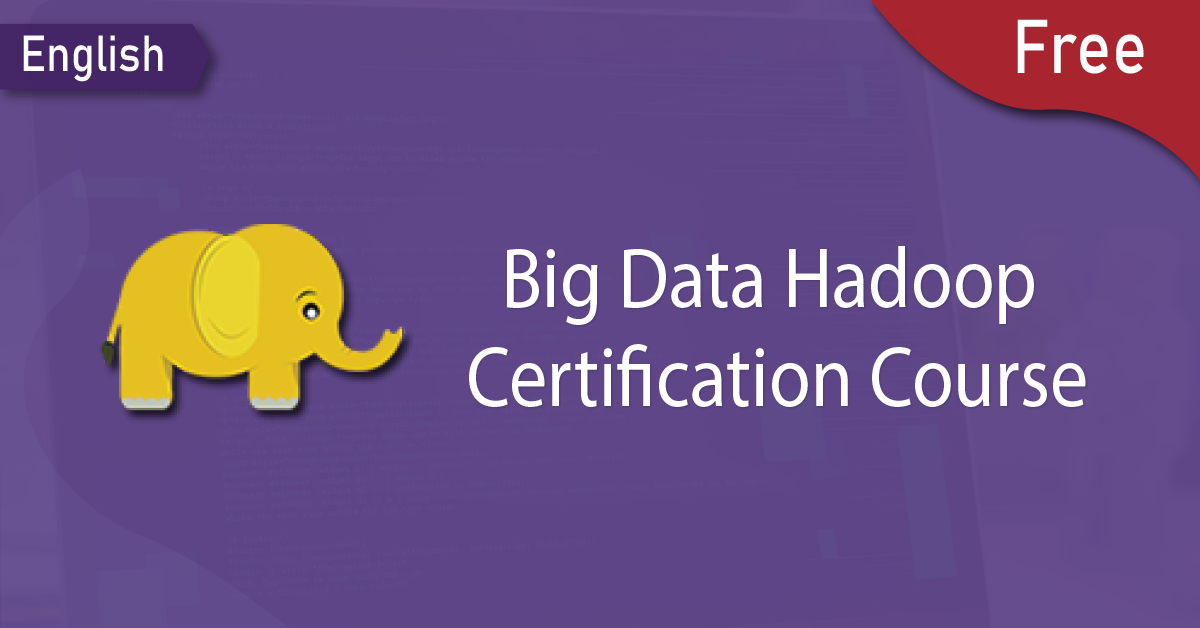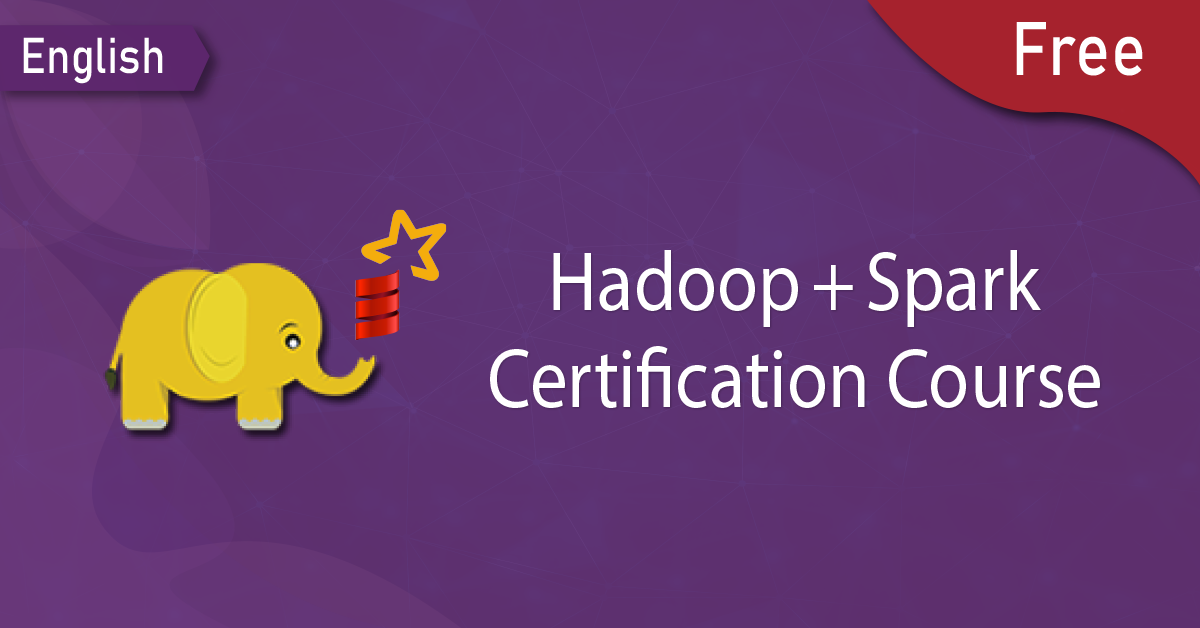Free Big Data Courses cover topics from data collection to storage to processing to analysis to visualization. You will gain knowledge of a variety of Big Data technologies and tools, including Apache Hadoop, Spark, Flink, Kafka, NoSQL databases, and data warehouses. You will work on real-time big data projects, play with real datasets, and become industry-ready.
Big Data Courses
What is Big Data?
Big data is the term used to describe the enormous amount of structured and unstructured data that is being produced and gathered at an unprecedented rate by businesses and individuals. This information comes from a wide range of sources, such as financial transactions, sensor data, website clickstreams, mobile app usage, social media interactions, and more.
It is distinguished from traditional data by its immense size, complexity, and rate of development. The three Vs that define it are Volume (the enormous amount of data), Velocity (the speed at which data is generated and processed), and Variety (the various types of data, such as text, photos, videos, and more). Big data’s potential to offer insightful information, facilitate informed choices, and spur innovation across industries is what makes it so significant.
Big data can be used by businesses to improve operations, identify fraud, boost product development, and many other things. It can also help businesses better understand their customers’ behavior. Businesses and data professionals utilize cutting-edge analytics, machine learning, and data processing technologies to extract valuable patterns, trends, and correlations from these enormous databases, transforming data into a strategic asset in the current digital era.
Why should you learn Big Data courses from DataFlair?
For several compelling reasons, learning about big data is crucial in today’s data-driven environment. In order to make informed decisions, optimize operations, and gain a competitive edge, organizations are becoming increasingly aware of the great worth of the amazing amount of data that is generated every day. As a result, big data specialists are highly sought after in many different businesses.
The ability to efficiently gather, handle, and analyze massive datasets is a skill that people acquire via learning about big data. Through the facilitation of data-driven plans and insights, this skill set not only improves career opportunities but also has a big positive effect on an organization’s success. Numerous industries, including marketing, shipping, healthcare, and finance, have been transformed by big data technology and techniques.
In order to study cutting-edge technologies like machine learning, artificial intelligence, and predictive analytics—which rely on enormous datasets to produce precise predictions and automate decision-making—one must first have a solid understanding of big data. It is rewarding and intellectually stimulating to investigate the topic of big data since it equips people to contribute to ground-breaking inventions and take on challenging real-world problems. Big Data is essentially the engine that will power future technological and commercial advancements, and gaining knowledge in this field can lead to rewarding and influential job prospects.
People who take a big data courses will be better prepared to manage the broad and complicated world of big data analytics. Organizations generate and store enormous volumes of data in today’s data-driven world, and there is an increasing need for experts who can use this data to extract insightful information and make defensible judgments.
Training benefits of Big Data courses
For those seeking to begin or grow in the field of data management and analytics, enrolling in big data training programs offers a multitude of advantages. First off, these programs offer well-organized learning tracks that cover a wide range of Big Data-related topics, such as data processing, storage, analysis, and visualization. Participants acquire real experience with state-of-the-art tools and technologies like Hadoop, Spark, and NoSQL databases, giving them the highly sought-after practical skills that companies are looking for.
Students have the chance to put their knowledge to use in practical situations through big data coursework, projects, and real-world case studies, consolidating their comprehension of Big Data ideas and best practices. Access to knowledgeable teachers and a welcoming learning environment are frequently included in big data training. Instructors with practical experience in the field can provide insightful advice and mentorship to students, assisting them in successfully navigating the challenges presented by Big Data.
A feeling of community is fostered and possibilities for networking and knowledge sharing are provided by collaborative learning settings, discussion forums, and peer interactions. Furthermore, many Big Data training courses provide certification alternatives, which can be an important credential for students, boosting their credibility and employability. A disciplined, encouraging, and skill-enhancing learning environment is offered by these big data training programs, putting participants on the road to mastering Big Data analytics and management.
Big Data Job Roles
Working in the big data industry has a number of advantages for the workplace that make it a desirable career path. Given the specific knowledge and experience needed to handle and analyze large datasets, professionals in this industry often earn attractive salaries. Big data specialists are in high demand across industries, which means there are plenty of work prospects and room for career advancement. Furthermore, the nature of a big data job frequently entails addressing difficult problems that stimulate the mind, making it a mentally stimulating subject.
- Big Data Engineers:
Big Data Engineers are in charge of planning, constructing, and maintaining the data pipelines and infrastructure needed to process and analyze enormous amounts of data. They use tools like Hadoop, Spark, and Kafka to make sure data is efficiently collected, stored, and transformed. To make sure that data is easily accessible for analysis and insights, big data engineers work with data scientists and analysts. - Data Scientist:
Data Scientists use their skills in machine learning and statistical analysis to glean important insights from massive data. In order to help firms make data-driven decisions, they build algorithms and models to find patterns, trends, and correlations inside huge datasets. Programming languages like Python or R are used by data scientists, who also frequently employ Jupyter Notebook and packages like TensorFlow and Scikit-Learn. - Big Data Analysts:
Big Data Analysts concentrate on deriving useful information from huge databases to use in decision-making. They produce eye-catching graphics and reports that clearly communicate complicated data results using data visualization technologies like Tableau or Power BI. In order to establish key performance indicators (KPIs) and produce reports that influence strategy and operations, these experts frequently collaborate closely with business stakeholders. - Data Engineer:
Data engineers are experts in creating, managing, and developing the data architecture needed to store and process huge data. To collect, purify, and transform data for analysis, they establish data pipelines, ensuring the accuracy and dependability of the data. Databases, ETL (Extract, Transform, Load) tools, and cloud-based data warehouses are common work environments for data engineers. - Machine Learning Engineer:
In order to use large data to address complicated problems, machine learning engineers design and deploy machine learning models at scale. They create and train models for applications like recommendation systems, image recognition, natural language processing, and more using frameworks like TensorFlow, PyTorch, or scikit-learn.
Big Data Courses FAQs
Apache Hadoop and its ecosystem (Hive, Pig, HBase), Apache Spark, Apache Flink, NoSQL databases such as MongoDB and Cassandra, data warehousing solutions such as Amazon Redshift and Google BigQuery, as well as programming languages such as Python and R, which have extensive libraries for data analysis and machine learning, are common tools for big data analytics. Machine learning frameworks like TensorFlow and scikit-learn help construct predictive models, while commercial products like Tableau and Power BI are frequently used for data visualization.
Both Kafka and Spark are potent instruments with specific applications in the data processing environment. Kafka is mainly a distributed streaming platform made for real-time data ingestion and processing, whereas Spark is a distributed data processing framework for batch and stream processing, including complicated data transformations and analytics. Data streams are gathered and distributed using Kafka, and then processed and analyzed using Spark.







